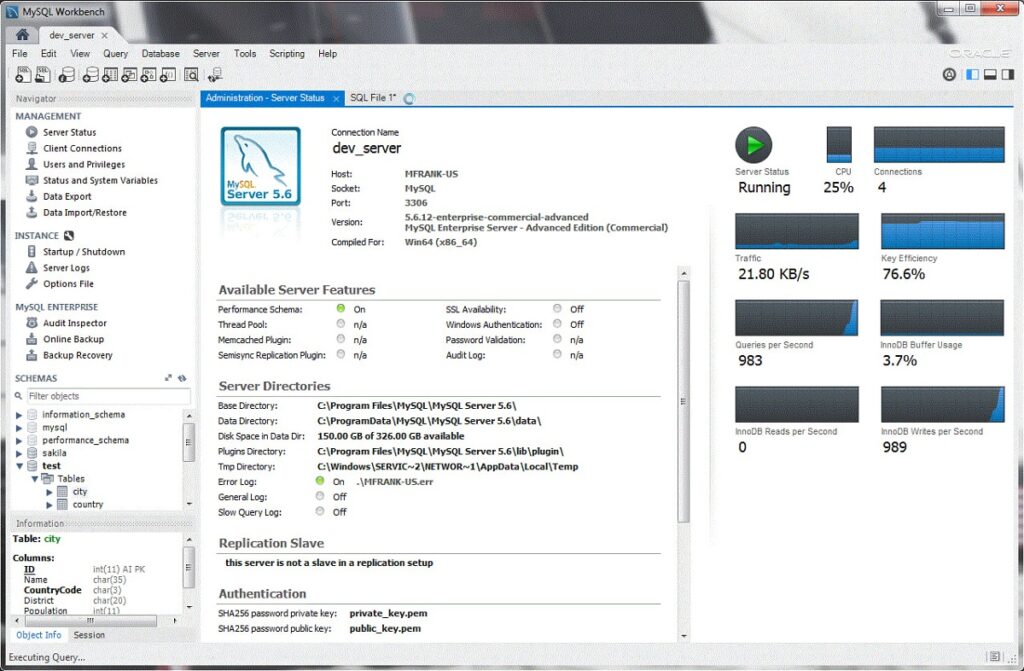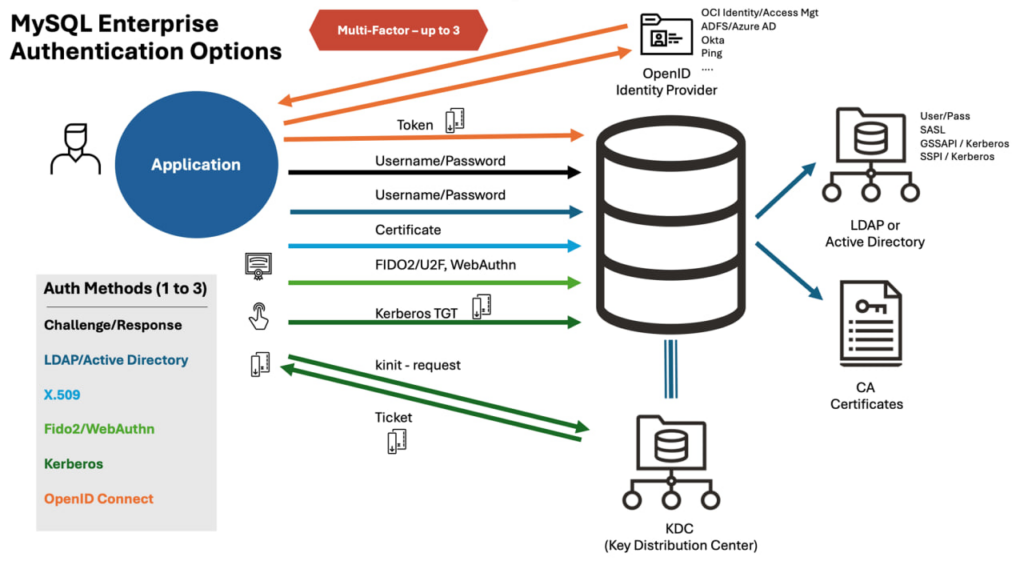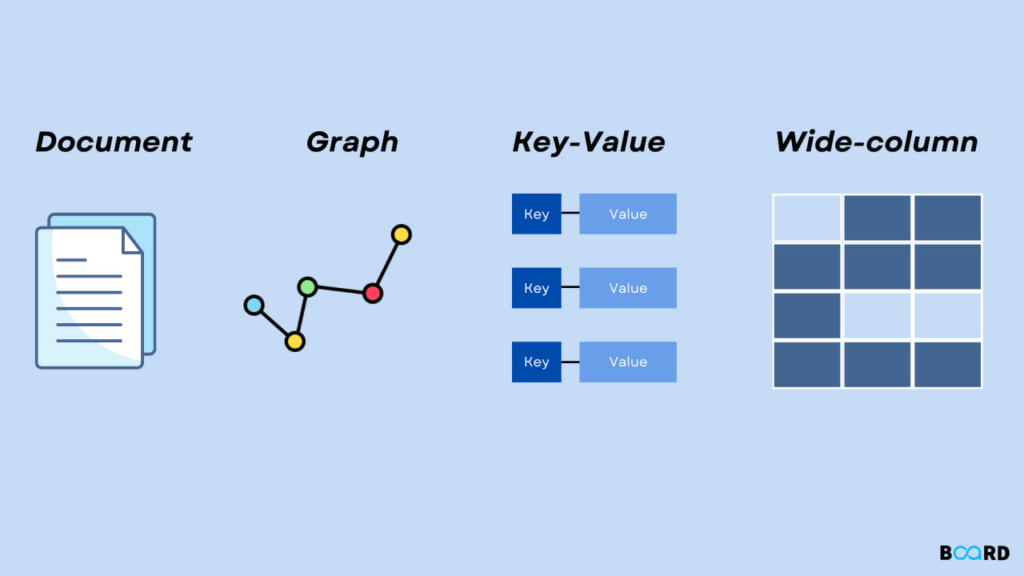MySQL vs NoSQL
By Alex Carter on September 16, 2024
Our world is more reliant on data today. It’s a huge driver for the expansion of database systems. There are already many alternatives out there. So, it might get confusing which one is the best fit for your exact project.
Today, we’ll focus on two popular options – mysql vs nosql. Keep reading and learn about their features and benefits!
What is MySQL?
MySQL is an open-source relational database management system. It was built by MySQL AB in 1995 and then Oracle acquired it. It is based on SQL which is a standardized language for interacting with databases.
Biggest Advantages
MySQL is famous for its straightforward installation and user-friendly interface. So, it’s a great choice for beginners. It offers graphical tools like MySQL Workbench. This instrument facilitates database design and management.

Also, this system supplies detailed documentation that outlines different elements, from basic queries to progressive optimization methodologies. An active community of developers and users can give you
- Forums;
- Tutorials;
- Troubleshooting assistance, etc.
Plus, its architecture is designed for fast data processing. So, it works great even under heavy loads. Features like request caching and partitioning ensure efficient data access and storage.
Key Features
You already know about some of the biggest pros of using MySQL. It’s easy to work with and it offers advanced support. Now, let’s concentrate on its main features.
Open Source
As we’ve mentioned it’s an open-source platform. So, you can use it for free and modify it to your specific needs. The source code is publicly available. So, it’s especially appealing if you have a small budget.
Scalability
MySQL supports many apps and handles millions of queries and transactions. It can help you organize one repository or a distributed system. This alternative has adaptable solutions like horizontal scaling through sharding and vertical scaling by upgrading server resources.
Cross-Platform Compatibility
MySQL runs on different operating systems. This cross-platform support allows you to integrate it into diverse environments without compatibility issues. It’s perfect if you work in heterogeneous settings or plan to migrate your applications between platforms.
Security Features
Also, this platform offers advanced safety features. It supports encryption protocols and offers strong authentication measures.

It gives you more control over user permissions. These security measures guarantee data confidentiality and integrity.
Rich SQL Support
MySQL supplies full SQL support. It has components like
- Joins;
- Subqueries;
- Views;
- Stored procedures;
- Triggers.
These SQL capabilities give an opportunity for advanced data manipulation and querying.
Replication
Also, this platform supports replication. You can easily copy data from one database server to another. This feature guarantees high availability and emergency response.
Full-Text Search
MySQL comes with full-text search functionality as well. This is especially useful for applications like content management systems and e-commerce platforms. You can implement advanced functionalities, like relevance ranking and Boolean searches.
Use Cases
MySQL powers the backend of many popular online platforms, including
- WordPress;
- Joomla;
- Drupal, etc.
They rely on it to preserve user information and configuration settings.
Some e-commerce platforms use it to manage product catalogs, customer information, and inventory. Also, CMS solutions rely on it for handling diverse forms of content.
Plus, we want to highlight that MySQL supports data warehousing. It allows us to keep and analyze large datasets. Many businesses use it to design reports and track KPIs.
All about NoSQL
NoSQL is a category of database processing systems that can work with large volumes of unstructured, semi-structured, and structured data. They offer more adaptability and versatility by employing different data frameworks.
Main Functionalities
NoSQL databases do not require a straightforward schema. You can save and process data without specifying its structure in advance. Also, they expand laterally. This indicates they can allocate data to different servers or nodes. So, they are excellent for coordinating large applications and big data flows.
These databases are excellent at managing raw data formats, like
- JSON;
- XML;
- Non-text files, etc.
So, they are suitable for content management and IoT data.
Plus, NoSQL systems prioritize eventual consistency. It improves availability and resilience in decentralized setups. This practice guarantees that all nodes in a dispersed system will have the same data in the end.
Common Types

We’ve gone through the fundamentals of NoSQL databases. Now, we will present the common types of these systems you can use.
Key-Value
These databases save information as key-value pairs. Each key is a special identifier and the value can be any type of data. They are relatively simple, as they depend on primary operations and have no query language. These alternatives are suitable for caching and session control.
Document
These systems store data in documents, using structures like JSON or BSON. They are schema-flexible and can adapt to changing data forms in the same set. This versatility is advantageous for
- CMSs;
- Product listings;
- Applications working with nested data.
Graph
Graph databases represent information as nodes, edges, and properties. Nodes represent entities and edges catch the relations between them. This format is ideal for complex queries. So, these systems are popular for dealing with social networks or recommendation engines.
Wide-Column Stores
Wide-column stores present data in rows and dynamic columns. They don’t require a fixed schema which makes them perfect for time-series data and large analytical workloads.
Main Advantages
What are the biggest pros of NoSQL systems?
The lack of a strict schema allows you to quickly adapt to altering conditions. This is really beneficial for new businesses and flexible development teams.
Their linear scalability lets you process giant sets by spreading them to separate servers. This lowers the chance of performance bottlenecks as the system grows.
NoSQL databases are optimized for specific workloads. They are much faster than relational ones. Also, you can easily integrate them with modern application architectures like microservices and cloud-native development.
Comparison MySQL vs NoSQL
You already know the characteristics and benefits of both options. Now, it’s time to decide which is more suitable for you. Yet, before selecting you need to evaluate their distinctions.
So, we made a table to help you assess mysql vs nosql.
| Aspect | MySQL | NoSQL |
|---|---|---|
| Structure | Relational and categorizes data into tables with fixed schemas | Non-relational and supports different data models |
| Schema Flexibility | Predefined schema requiring uniform data and complex migrations | Customizable schemas for adding and adjusting fields |
| Scalability | Scales vertically and horizontally | Horizontal scaling |
| Data Validity and Transactions | Supports ACID transactions | Promotes eventual consistency |
| Query Language | Standardized SQL for complex queries and joins | Query languages differ by database |
| Performance | Excels with structured data and complicated joins | Handles large volumes of unstructured data, high write speeds, and low-latency queries |
| Use Cases | E-commerce platforms, financial frameworks, CMS | Social networks, IoT data storage, big data analytics |
| Community and Support | Extensive reports and third-party instruments | Growing community with database-specific support |
So, you’re probably interested in which one of these two to pick. Remember that the choice between mysql vs nosql depends on your specific project requirements.
MySQL will be a perfect option if
- Your data is highly structured and requires strict consistency;
- You need sophisticated search and join functionalities;
- Your application operates in domains like e-commerce, financial systems, or CMS;
- You prefer a mature technology with full documentation and additional support.
NoSQL will be a great choice when
- Your application works with big volumes of unstructured or semi-structured data;
- You focus on scalability and need to handle high write or read loads efficiently;
- You’re building real-time applications, like social media platforms or IoT systems;
- You need flexibility in schema design to match the changing requirements.
Also, a hybrid approach might be a great option in some cases. For example, an application may use MySQL for transactional data and NoSQL for analytics or logging. This allows you to benefit from the strengths of both database types.
Conclusion
The choice between mysql vs nosql is not the easiest. Both systems have their strengths and restrictions. Your judgment depends on the nuances of your project only.
MySQL will be a better option if you need more structure. It provides thorough resources, powerful security, and cross-platform support. NoSQL is more flexible. These databases are fast and scalable. So, it’s a great choice if you have to handle large volumes of data.
Hope that you found something useful! Remember to carefully evaluate your needs and capabilities before picking mysql vs nosql.
Posted in blog, Web Applications
Alex Carter
Alex Carter is a cybersecurity enthusiast and tech writer with a passion for online privacy, website performance, and digital security. With years of experience in web monitoring and threat prevention, Alex simplifies complex topics to help businesses and developers safeguard their online presence. When not exploring the latest in cybersecurity, Alex enjoys testing new tech tools and sharing insights on best practices for a secure web.
